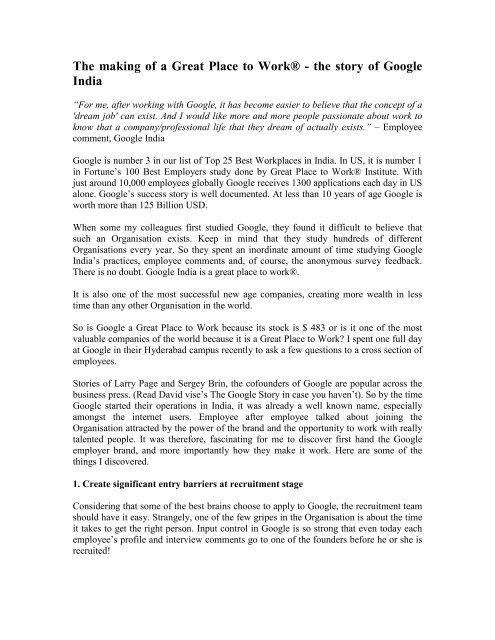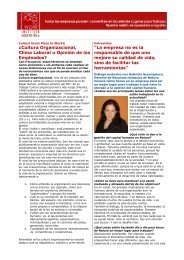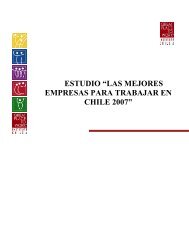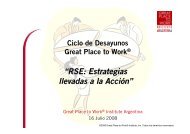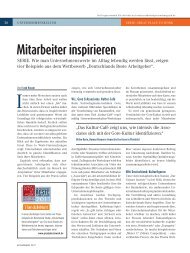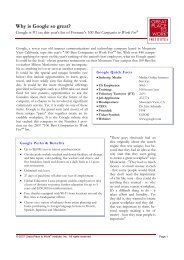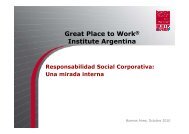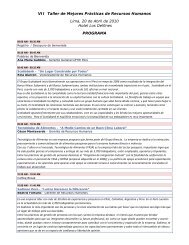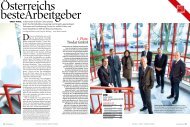The making of a Great Place to Work® - the story of Google India
The making of a Great Place to Work® - the story of Google India
The making of a Great Place to Work® - the story of Google India
You also want an ePaper? Increase the reach of your titles
YUMPU automatically turns print PDFs into web optimized ePapers that Google loves.
<strong>The</strong> <strong>making</strong> <strong>of</strong> a <strong>Great</strong> <strong>Place</strong> <strong>to</strong> <strong>Work®</strong> - <strong>the</strong> s<strong>to</strong>ry <strong>of</strong> <strong>Google</strong><br />
<strong>India</strong><br />
“For me, after working with <strong>Google</strong>, it has become easier <strong>to</strong> believe that <strong>the</strong> concept <strong>of</strong> a<br />
'dream job' can exist. And I would like more and more people passionate about work <strong>to</strong><br />
know that a company/pr<strong>of</strong>essional life that <strong>the</strong>y dream <strong>of</strong> actually exists.” – Employee<br />
comment, <strong>Google</strong> <strong>India</strong><br />
<strong>Google</strong> is number 3 in our list <strong>of</strong> Top 25 Best Workplaces in <strong>India</strong>. In US, it is number 1<br />
in Fortune’s 100 Best Employers study done by <strong>Great</strong> <strong>Place</strong> <strong>to</strong> <strong>Work®</strong> Institute. With<br />
just around 10,000 employees globally <strong>Google</strong> receives 1300 applications each day in US<br />
alone. <strong>Google</strong>’s success s<strong>to</strong>ry is well documented. At less than 10 years <strong>of</strong> age <strong>Google</strong> is<br />
worth more than 125 Billion USD.<br />
When some my colleagues first studied <strong>Google</strong>, <strong>the</strong>y found it difficult <strong>to</strong> believe that<br />
such an Organisation exists. Keep in mind that <strong>the</strong>y study hundreds <strong>of</strong> different<br />
Organisations every year. So <strong>the</strong>y spent an inordinate amount <strong>of</strong> time studying <strong>Google</strong><br />
<strong>India</strong>’s practices, employee comments and, <strong>of</strong> course, <strong>the</strong> anonymous survey feedback.<br />
<strong>The</strong>re is no doubt. <strong>Google</strong> <strong>India</strong> is a great place <strong>to</strong> work®.<br />
It is also one <strong>of</strong> <strong>the</strong> most successful new age companies, creating more wealth in less<br />
time than any o<strong>the</strong>r Organisation in <strong>the</strong> world.<br />
So is <strong>Google</strong> a <strong>Great</strong> <strong>Place</strong> <strong>to</strong> Work because its s<strong>to</strong>ck is $ 483 or is it one <strong>of</strong> <strong>the</strong> most<br />
valuable companies <strong>of</strong> <strong>the</strong> world because it is a <strong>Great</strong> <strong>Place</strong> <strong>to</strong> Work? I spent one full day<br />
at <strong>Google</strong> in <strong>the</strong>ir Hyderabad campus recently <strong>to</strong> ask a few questions <strong>to</strong> a cross section <strong>of</strong><br />
employees.<br />
S<strong>to</strong>ries <strong>of</strong> Larry Page and Sergey Brin, <strong>the</strong> c<strong>of</strong>ounders <strong>of</strong> <strong>Google</strong> are popular across <strong>the</strong><br />
business press. (Read David vise’s <strong>The</strong> <strong>Google</strong> S<strong>to</strong>ry in case you haven’t). So by <strong>the</strong> time<br />
<strong>Google</strong> started <strong>the</strong>ir operations in <strong>India</strong>, it was already a well known name, especially<br />
amongst <strong>the</strong> internet users. Employee after employee talked about joining <strong>the</strong><br />
Organisation attracted by <strong>the</strong> power <strong>of</strong> <strong>the</strong> brand and <strong>the</strong> opportunity <strong>to</strong> work with really<br />
talented people. It was <strong>the</strong>refore, fascinating for me <strong>to</strong> discover first hand <strong>the</strong> <strong>Google</strong><br />
employer brand, and more importantly how <strong>the</strong>y make it work. Here are some <strong>of</strong> <strong>the</strong><br />
things I discovered.<br />
1. Create significant entry barriers at recruitment stage<br />
Considering that some <strong>of</strong> <strong>the</strong> best brains choose <strong>to</strong> apply <strong>to</strong> <strong>Google</strong>, <strong>the</strong> recruitment team<br />
should have it easy. Strangely, one <strong>of</strong> <strong>the</strong> few gripes in <strong>the</strong> Organisation is about <strong>the</strong> time<br />
it takes <strong>to</strong> get <strong>the</strong> right person. Input control in <strong>Google</strong> is so strong that even <strong>to</strong>day each<br />
employee’s pr<strong>of</strong>ile and interview comments go <strong>to</strong> one <strong>of</strong> <strong>the</strong> founders before he or she is<br />
recruited!
<strong>Google</strong>’s core values start with <strong>the</strong> statement “We want <strong>to</strong> work with great people.” Back<br />
in <strong>the</strong> early years, when <strong>the</strong> Organisation was yet <strong>to</strong> make money, <strong>the</strong> founders were busy<br />
recruiting <strong>the</strong> best talent when many o<strong>the</strong>rs were busy letting <strong>the</strong>m go.(Remember <strong>the</strong><br />
technology companies meltdown in 2000-01). All <strong>Google</strong> wanted at that time was <strong>to</strong><br />
make a great product that would enable <strong>the</strong> entire world’s information <strong>to</strong> be accessible <strong>to</strong><br />
everyone at any time. <strong>The</strong>y were not sure how it would help <strong>the</strong>m make money. But <strong>the</strong>y<br />
were sure <strong>the</strong>y could not do it without <strong>the</strong> best brains. And if <strong>the</strong> best brains come<br />
<strong>to</strong>ge<strong>the</strong>r, money will follow. What <strong>Google</strong> could not <strong>of</strong>fer in money, <strong>the</strong>y made up in<br />
s<strong>to</strong>cks and in dreams <strong>to</strong> change <strong>the</strong> way <strong>the</strong> world accesses information. And as <strong>the</strong><br />
comment <strong>of</strong> <strong>the</strong> employee quoted above indicates, some dream jobs do come true.<br />
It is not unusual for each candidate <strong>to</strong> have from six <strong>to</strong> even eleven interviews! One <strong>of</strong><br />
<strong>the</strong> senior most managers in Hyderabad, Roy Gilbert Direc<strong>to</strong>r <strong>of</strong> Online Sales &<br />
Operations confesses <strong>to</strong> spending 50 per cent <strong>of</strong> his time on meeting candidates. He is not<br />
alone. All managers who interview candidates go through Interview workshops. As one<br />
employee said, “<strong>The</strong> managers who interviewed me were genuinely interested in me as a<br />
person. <strong>The</strong>y were taking notes. One even made a cup <strong>of</strong> c<strong>of</strong>fee for me.”<br />
<strong>Google</strong> is reputed for its ma<strong>the</strong>matics conundrums during recruitment screening. For<br />
example, how would you solve <strong>the</strong> cryptic equation WWWDOT-GOOGLE=DOTCOM,<br />
knowing that values <strong>of</strong> M & E could be interchanged. Or you may simply be asked what<br />
is <strong>the</strong> most beautiful math equation derived.<br />
No wonder, <strong>the</strong> Recruitment team in <strong>India</strong> boasts <strong>of</strong> working for one <strong>of</strong> those rare<br />
companies that does not hold <strong>the</strong>m accountable for filling vacancies in specific time. And<br />
once an employee joins <strong>the</strong>re is a “Buddy” <strong>to</strong> make him feel right at home. But what<br />
makes many employees stay is <strong>the</strong> next point.<br />
2. Trust, Empowerment and Freedom<br />
Once an employee joins <strong>Google</strong> she experiences a pleasant change from many a previous<br />
employer. <strong>The</strong>re is rarely a boss who continuously looks over her shoulder <strong>to</strong> figure out<br />
what <strong>the</strong> employee is doing. In fact, <strong>of</strong>ficially <strong>the</strong> employee is <strong>to</strong>ld that 20 per cent <strong>of</strong> her<br />
time is free <strong>to</strong> do what she pleases. Heard <strong>of</strong> <strong>Google</strong> Talk, <strong>Google</strong> News, <strong>Google</strong> Finance<br />
and gmail? <strong>The</strong>y all started as a “20 per cent project”!<br />
<strong>Google</strong>’s philosophy is simple, “Get <strong>the</strong> brightest people in and create an environment<br />
that enables <strong>the</strong>m <strong>to</strong> perform.” Employees seem <strong>to</strong> reciprocate this trust by being<br />
obsessed about innovation building great products and services. All new products are<br />
launched internally, so that employees get a chance <strong>to</strong> give <strong>the</strong>ir vote <strong>of</strong> confidence or<br />
lack <strong>of</strong> it before cus<strong>to</strong>mers do. Employees keep developing <strong>the</strong>ir expertise and<br />
consequently roles keep changing <strong>to</strong> keep pace with <strong>the</strong> employee’s development.<br />
Something traditional HR experts with rigid job descriptions will find difficult <strong>to</strong> adjust<br />
<strong>to</strong>. <strong>The</strong> beauty <strong>of</strong> working for a <strong>Google</strong> is that one rarely gets caught in an endless routine<br />
job. None <strong>of</strong> <strong>Google</strong>’s products remain <strong>the</strong> same even in <strong>the</strong> short term. (Unknown <strong>to</strong><br />
many, <strong>Google</strong>’s search quality keeps improving continuously)
<strong>The</strong> environment at <strong>Google</strong> is akin <strong>to</strong> a successful University. Sergei Brin is quoted as<br />
saying, “We run <strong>Google</strong> a bit like a university. We have lots <strong>of</strong> projects, about 100 <strong>of</strong><br />
<strong>the</strong>m, from molecular biology <strong>to</strong> building hardware, being done by teams <strong>of</strong> three or so<br />
people.” (<strong>The</strong> <strong>Google</strong> S<strong>to</strong>ry – David A. Vise)<br />
<strong>Google</strong> realizes that a key <strong>to</strong> this culture <strong>of</strong> empowerment is accepting mistakes and<br />
failures. No project is rejected by its inability <strong>to</strong> predict viable cash flows. Indeed, viable<br />
cash flows can never be <strong>the</strong> primary criteria for <strong>making</strong> a business decision, as<br />
advertisers who want <strong>to</strong> influence <strong>Google</strong>’s search results have found out.<br />
<strong>The</strong> relationship <strong>of</strong> trust that <strong>Google</strong> has with its employees is also reflected in <strong>the</strong><br />
relationships it has with its users. Which is why, when <strong>Google</strong> decided <strong>to</strong> accept<br />
Government censorship laws in China (<strong>Google</strong>, however, notifies users when results have<br />
been censored) it was a major letdown for many people. While most <strong>of</strong> its competi<strong>to</strong>rs<br />
were already complying with <strong>the</strong> law <strong>of</strong> <strong>the</strong> land in China, it seems that when it came <strong>to</strong><br />
<strong>Google</strong>, people put it on a higher pedestal. We trust <strong>Google</strong> <strong>to</strong> give us access <strong>to</strong><br />
information in an unbiased and transparent manner.<br />
With so much <strong>of</strong> trust on employees, what happens <strong>to</strong> <strong>the</strong> bad eggs? A few who might be<br />
tempted <strong>to</strong> be freeloaders? Surely, <strong>the</strong>re must be some kind <strong>of</strong> forced ranking <strong>to</strong> weed out<br />
non-performers? <strong>The</strong> answer I received from senior executives and a cross section <strong>of</strong><br />
employees was a clear No.<br />
This brings me <strong>to</strong> <strong>the</strong> third aspect <strong>of</strong> <strong>the</strong> <strong>Google</strong>’s employer brand.<br />
3. Feedback, feedback & some more feedback<br />
Want <strong>to</strong> challenge a recent business decision or simply ask a question. TGIF (Thank God<br />
it’s Friday) meetings could be <strong>the</strong> forum for you. If you think <strong>the</strong>re are o<strong>the</strong>rs interested<br />
in your pet <strong>to</strong>pic start an email group. TGIF is done religiously in all locations including<br />
in Global HO where <strong>the</strong> Founders do it <strong>the</strong>mselves whenever <strong>the</strong>y are present. <strong>The</strong><br />
quarterly targets <strong>of</strong> any employee are available in <strong>the</strong> intranet. <strong>Google</strong> believes in taking<br />
stretch targets, and <strong>the</strong> targets and <strong>the</strong>ir achievement are transparent for all <strong>to</strong> see. When<br />
you have recruited some <strong>of</strong> <strong>the</strong> best brains, an open objectives and key results could be a<br />
powerful motiva<strong>to</strong>r. This is also a good antidote <strong>to</strong> inflated egos which some <strong>of</strong> <strong>the</strong> best<br />
brains are likely <strong>to</strong> develop in an environment where <strong>the</strong>y are not surrounded by equally<br />
bright or brighter colleagues.<br />
Working with great people can have its pitfalls. Many Organisations have found <strong>to</strong> <strong>the</strong>ir<br />
peril that internal unhealthy competition can quickly kill ideas and initiative. <strong>Google</strong><br />
<strong>India</strong> seems <strong>to</strong> have succeeded in avoiding this. One key reason is <strong>the</strong> personal feedback<br />
process. Once in six months all key stakeholders for an employee gives feedback on her<br />
performance and <strong>the</strong> feedback is not an objective five point scale <strong>to</strong> be ticked. Employees<br />
receive pages <strong>of</strong> written comments detailing strengths and areas <strong>of</strong> development with<br />
concrete examples.
It is this feedback culture which makes any freeloader or “Non-<strong>Google</strong>” behaviour<br />
difficult <strong>to</strong> sustain, even if <strong>the</strong> behaviour is <strong>of</strong> your boss. “One person alone cannot affect<br />
your career positively or negatively, even if he is your boss,” I heard many employees<br />
saying.<br />
In fact <strong>the</strong> culture <strong>of</strong> feedback in <strong>Google</strong> <strong>India</strong> is so strong that <strong>the</strong> structure/ design <strong>of</strong><br />
<strong>the</strong> appraisal process become almost secondary. I am tempted <strong>to</strong> believe that if <strong>the</strong> six<br />
monthly feedback form was a blank sheet <strong>of</strong> power, employees would still get rich<br />
feedback.<br />
It is this culture that makes <strong>Google</strong> globally, and in <strong>India</strong> a winner in <strong>the</strong> talent market.<br />
People are not HR department’s responsibility. <strong>The</strong>re is collective ownership for people<br />
and people related issues.<br />
And this brings me <strong>to</strong> my last point about <strong>Google</strong>.<br />
4. <strong>Google</strong> really cares about its people.<br />
Here is a quiz from Fortune magazine on <strong>Google</strong>. Larry Page, <strong>Google</strong>’s founder is said <strong>to</strong><br />
have proclaimed, “No human worker should be more than<br />
a. 20 feet away<br />
b. 150 feet away<br />
c. An eleva<strong>to</strong>r away<br />
d. A hallway away<br />
from food.”<br />
Regardless <strong>of</strong> which is <strong>the</strong> correct option, when you visit <strong>Google</strong> <strong>India</strong> you will come<br />
back convinced that <strong>the</strong> quote is correct. Once on campus, <strong>Google</strong>rs don’t need <strong>to</strong> worry<br />
about finding some excellent <strong>India</strong>n and continental breakfast. Throughout <strong>the</strong> day<br />
<strong>Google</strong>rs have access <strong>to</strong> snacks <strong>of</strong> all kinds, fresh fruit; and meals <strong>of</strong> gourmet Asian,<br />
Italian, <strong>India</strong>n, Mexican, or American fare.<br />
Needless <strong>to</strong> say, after all this food, fitness is a key priority for <strong>Google</strong>, with <strong>the</strong><br />
Organisation providing Gym, cardio exercises, aerobics and yoga.<br />
<strong>Google</strong>’s employee care is more a philosophy and not a checklist based approach. For<br />
example if employees do not like <strong>the</strong> c<strong>of</strong>fee, it will be changed ra<strong>the</strong>r than being <strong>to</strong>ld that<br />
<strong>the</strong> c<strong>of</strong>fee machine is <strong>of</strong> reputed quality.<br />
As one employee put it, “Much like <strong>the</strong> Surf Excel Ad “Dag Ache he”, when it comes <strong>to</strong><br />
employee costs we believe, “Kharche ache he”<br />
In an age when many Organisations’ HR mantra seems <strong>to</strong> be cash out <strong>of</strong> all perquisites,<br />
<strong>Google</strong>’s approach <strong>to</strong> caring for employees seems <strong>to</strong> be paying <strong>of</strong>f. Or as one employee<br />
put it bluntly, “It is a strategy. Do all it takes for employees, but keeps raising <strong>the</strong> bar.”
<strong>Google</strong> deliberately sought <strong>to</strong> create great products (“We raise <strong>the</strong> world’s IQ”, said an<br />
employee). To create great products it had <strong>to</strong> attract <strong>the</strong> best talent. In <strong>the</strong> process it<br />
created one <strong>of</strong> <strong>the</strong> most valuable companies.<br />
_________________________________________________________________<br />
<strong>The</strong> author is CEO <strong>of</strong> <strong>The</strong> <strong>Great</strong> <strong>Place</strong> <strong>to</strong> <strong>Work®</strong> Institute, <strong>India</strong>. He can be reached at<br />
pbhattacharya@greatplace<strong>to</strong>work.in Views expressed are personal, and are based on<br />
information provided by <strong>Google</strong> <strong>India</strong> and employees <strong>of</strong> <strong>Google</strong> <strong>India</strong>.


